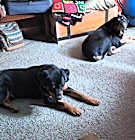Rottweilers are large, powerful dogs with a robust and muscular build. They have a broad head, strong jawline, and deep chest. Their ears are typically medium-sized, triangular, set high on the head, and often folded downward.
Rottweiler
Breed Type: Working
Common nicknames: Rott, Rottie
Coat: Smooth
Hypoallergenic: No, they will likely trigger allergies.
Temperament: Loyal, intelligent, protective, affectionate
Life expectancy: 8-12 years
Color & patterns: Black and tan

The Rottweiler, or “Rottie” for short, is something of a sheep in wolf’s clothing: They may look tough on the outside, with their powerful build and imposing presence — they typically weigh between 80 and 135 pounds — but they’re really just gentle giants who want to snuggle up with their families. Rottweilers are also highly trainable and excel at everything from obedience to therapy work. These dogs are strong, loyal, and always have your back — what more could you want?
Rottweiler characteristics
Learn about about Rottweiler basics like their fur colors, shedding levels, how much grooming they need, and other Rottweiler facts.
Average height
23-27 inches (58.4-68.6cm)
Average weight
72-132 pounds (32.7-59.9 kg)
Average lifespan
8-12 years
Exercise needs
Grooming needs
Full-grown size
Good with cats
Good with kids
Training aptitude
Do Rottweilers shed?
Yes, Rottweilers shed. They have a short, dense double coat that sheds moderately throughout the year. While they are not considered heavy shedders compared to some other breeds, Rottweilers shed their coats in the spring and fall.
What is the rarest color of Rottweiler?
The rarest color of Rottweiler is red. This unique coloring is due to a recessive gene.
What color are Rottweilers?
Rottweilers are black with tan markings. The black coat covers most of the body, while the tan markings appear on specific areas such as the cheeks, chest, legs, and eyebrows. These tan markings are usually a rich mahogany or rust color and accentuate the dog’s features. Rottweilers can also be red, white, or blue, but these colors are uncommon.
How big does a Rottweiler get?
Rottweilers weigh between 80 and 135 pounds and stand around 22 to 27 inches tall. Males are often bigger than females.
When is a Rottweiler full-grown?
A Rottweiler is full-grown between 18 months and two years old. Some Rottweilers may continue to fill out and develop muscle until they are around three years old.
What is a Rottweiler?
A Rottweiler is a large and powerful dog breed known for its strength, loyalty, and protective instincts. They are popular guard dogs, police dogs, and family companions due to their intelligence, confidence, and affectionate nature.
How long do Rottweilers live?
Rottweilers live between nine and 10 years. Individual lifespan can vary based on genetics, diet, exercise, veterinary care, and overall health management.
What are the three types of Rottweiler?
The three types of Rottweiler are the Roman Rottweiler, the German Rottweiler, and the American Rottweiler. While some people may use terms like “Roman Rottweiler,” “German Rottweiler,” and “American Rottweiler” to describe variations within the breed, it’s important to note that there are no official or widely recognized distinctions between these types.
What two breeds make a Rottweiler?
The two breeds that make a Rottweiler are Mastiffs and Sheepdogs. The Rottweiler’s lineage traces back to the Mastiff-like dogs that served as cattle herders for the ancient Romans during their campaigns in Europe. When some of these dogs remained in Germany after the Roman armies departed, they interbred with local Sheepdogs, resulting in the development of the Rottweiler breed.
Is a Rottweiler a large or extra-large breed?
A Rottweiler is a large breed. While they are robust and muscular, they do not fall into the category of extra-large breeds such as Great Danes or Mastiffs.
Rottweiler history
Learn about where this Rottweiler came from!
What is a Rottweiler bred for?
Rottweilers were originally bred to be working dogs. Historically, they were used as herding and guarding dogs by the Roman Empire to drive cattle and protect livestock. Later, during the Middle Ages, Rottweilers were employed by butchers to guard and transport meat carts to market.
Where are Rottweilers from?
Rottweilers originated from the town of Rottweil in the state of Baden-Württemberg, Germany. Their long history dates back to the Roman Empire, where they were used as herding and guarding dogs.
Rottweiler temperament
Learn about about the Rottweiler temperament and how well they fit into your lifestyle, home environment, and family.
Are Rottweilers good dogs?
Yes, Rottweilers are good dogs for the right pet parents. They are known for their loyalty, intelligence, and protective instincts, making them dedicated family pets. It’s important to note that Rottweilers require proper training and socialization to thrive. These pups are large and powerful and need consistent leadership and boundaries to ensure they develop into well-mannered companions.
Are Rottweilers good with kids?
Yes, Rottweilers can be good with kids when their pet parents properly train, socialize, and raise them in a positive environment. They are often affectionate and protective of their families, including children, and can form strong bonds with them.
However, due to their large size and strength, it’s essential to supervise interactions between Rottweilers and children, especially younger ones, to prevent accidental injuries. Teaching children how to properly approach and handle dogs is also crucial to ensure positive experiences for both the dog and the child.
Are Rottweilers aggressive?
No, Rottweilers are not naturally aggressive. While they have a protective instinct and can be wary of strangers, they are calm, confident, and even-tempered when properly trained and socialized. Aggression in Rottweilers is typically the result of a lack of socialization or mistreatment rather than an inherent trait of the breed.
If you are concerned by any signs of aggression or reactivity in your dog, be sure to address it promptly with the help of a professional trainer or behaviorist. Pain, discomfort, or underlying medical conditions can sometimes contribute to changes in a dog’s behavior, so it may also be worth visiting a vet to rule out their health as a cause for their behavior.
Are Rottweilers easy to train?
Yes, Rottweilers are easy to train for pet parents who are committed to providing structure and guidance. These pups are intelligent and capable of learning quickly. Rottweilers respond well to consistent and positive reinforcement-based training methods.
However, training any dog takes substantial time and effort, regardless of breed, and Rottweilers may face some training challenges; for example, they can be independent-minded and assertive, which may require firm and patient handling from their pet parents.
Do Rottweilers bark a lot?
No, Rottweilers don’t bark a lot. They are naturally protective of their territory, however, and may bark to alert their pet parents to potential threats or intruders. Proper training and socialization from a young age can help prevent excessive barking tendencies and ensure that Rottweilers learn appropriate behaviors.
Is a Rottweiler a good family dog?
Yes, a Rottweiler can be a good family dog in the right circumstances. They are known for their loyalty, affection, and protective nature, which can make them devoted family companions. However, Rottweilers require early socialization, consistent training, and responsible pet parenting to ensure they develop into well-adjusted family members.
Are Rottweilers good with cats?
Yes, Rottweilers can be good with cats, but it depends on their individual temperament, socialization, and training. Some Rottweilers may coexist peacefully with cats, especially if they are raised together from a young age and taught to respect each other’s boundaries. However, Rottweilers have a strong prey drive, so careful supervision and gradual introductions are essential to ensure the safety of both the cat and the dog.
Are Rottweilers good with other dogs?
Yes, Rottweilers can be good with other dogs, but their behavior towards other dogs can vary depending on their socialization, training, and individual personality. Properly socialized and trained Rottweilers can enjoy positive interactions with other dogs, especially when introduced in a controlled and supervised manner. However, some Rottweilers may display dominance or aggression towards unfamiliar dogs, so early socialization and ongoing training are important for fostering good canine relationships.
Are Rottweilers smart?
Yes, Rottweilers are smart. Known for their problem-solving abilities, they are quick learners and can excel in various training activities, including obedience, agility, and even advanced tasks such as search and rescue work.
Are Rottweilers good guard dogs?
Yes, Rottweilers are good guard dogs. They are naturally protective of their families and territory and can deter potential intruders with their intimidating appearance and confident demeanor.
Are Rottweilers good hiking dogs?
Yes, Rottweilers are good hiking dogs thanks to their high energy levels, endurance, and muscular build. They enjoy physical activity and can handle long walks or hikes with proper training and conditioning.
Can a Rottweiler be a service dog?
Yes, a Rottweiler can be a service dog due to their intelligence and problem-solving skills. With proper training, socialization, and temperament evaluation, some Rottweilers can excel in service dog roles and provide valuable assistance and companionship to their handlers.
Are Rottweilers good apartment dogs?
No, Rottweilers are not good apartment dogs due to their large size, energy levels, and need for space and exercise. They thrive in environments with ample room to move around and engage in physical activity. Additionally, Rottweilers may vocalize or become restless if they are confined to a small living space for extended periods without sufficient exercise and mental stimulation.
Are Rottweilers good first dogs?
No, Rottweilers are not good first dogs due to their large size, strong personality, and need for consistent training and socialization. While Rottweilers can be loyal and affectionate companions, they require firm leadership, consistent training, and early socialization. First-time pet parents may find it beneficial to work with a reputable trainer or enroll in obedience classes to learn effective training techniques and establish a strong bond with their Rottweiler.
Are Rottweilers lazy dogs?
No, Rottweilers are not lazy dogs.They are known for their strength, endurance, and energetic nature. Rottweilers enjoy physical activity and require regular exercise to stay healthy and mentally stimulated.
Rottweiler health
Learn about about the Rottweiler health outlook and what diseases they may be prone to at various stages of their life.
Is the Rottweiler a healthy dog?
Yes, Rottweilers are healthy but can be prone to certain conditions, including:
Hip dysplasia: Hip dysplasia is a common orthopedic condition where the hip joint develops abnormally, leading to instability, pain, and eventually arthritis. It can cause lameness and difficulty moving, particularly as the dog ages. Regular exercise, maintaining a healthy weight, and breeding from dogs with good hip scores can help reduce the risk of hip dysplasia.
Elbow dysplasia: Elbow dysplasia is a developmental condition that affects the elbow joint, leading to abnormal growth and function. It can cause lameness, pain, and stiffness in the front limbs, impacting the dog’s mobility and quality of life. Treatment may involve medication, physical therapy, or surgical intervention, depending on the severity of the condition.
Subaortic stenosis: Subaortic stenosis is an inherited heart condition most common in larger breed dogs and is present at birth. It occurs when a dog is born with an abnormally narrow aortic valve, which controls blood flow from the left ventricle to the aorta. The narrowing makes it difficult for blood to flow properly through the heart and can cause fainting and even sudden death. Your vet can detect it and prescribe the proper treatment.
Osteosarcoma: Osteosarcoma is a type of bone cancer that commonly affects large and giant breed dogs like Rottweilers. It typically occurs in the long bones of the limbs and can cause lameness, swelling, and pain. Treatment may involve amputation of the affected limb, chemotherapy, and pain management to improve the dog’s quality of life.
Gastric dilatation-volvulus (GDV): GDV, also known as bloat, is a life-threatening emergency that can occur in deep-chested breeds like Rottweilers. It involves the stomach filling with gas and twisting on its axis, leading to a blocked blood supply and potentially fatal consequences. Prompt veterinary intervention is required to stabilize the dog and perform emergency surgery to correct the twisting of the stomach.
Are Rottweilers hypoallergenic?
No, Rottweilers are not hypoallergenic. They have a short, dense double coat that sheds moderately throughout the year. This shedding can release dander and allergens into the environment, which may trigger allergic reactions in susceptible individuals. Rottweilers also produce saliva and secrete proteins through their skin, both of which can also contribute to allergic responses in some people.
Do Rottweilers need a lot of exercise?
Yes, Rottweilers need a lot of exercise. They are a breed with high energy levels and thrive on regular physical activity and mental stimulation. Daily exercise such as brisk walks, runs, or play sessions in a secure area can help meet their exercise needs and prevent boredom or destructive behavior.
Popular Rottweiler mixes
Breeds that mix with Rottweilers include Newfoundlands and Huskies. Other breeds that mix well with Rottweilers include:
New Rottland (Rottweiler + Newfoundland)
Rottsky (Rottweiler + Siberian Husky)
Pitweiler (Rottweiler + Pitbull)
Schnottie (Rottweiler + Schnauzer)

Find Rottweiler puppies near you
Adopting a Rottweiler
Learn about acquiring a Rottweiler - the pros and cons of adopting versus going through a breeder, and associated costs.

Henry and Raaz
Rottweiler
Male, adult
Westerville, OH
Not good with dogs
Not good with cats
Needs experienced adopter
House-trained
Spayed or Neutered

Nika
Rottweiler Cattle Dog
Female, adult
Sunbury, OH
Not good with dogs
Not good with cats
House-trained
Spayed or Neutered
Shots are up-to-date

Mongo
Rottweiler
Male, 7 yrs 10 mos
Delaware, OH
Not good with dogs
Not good with cats
House-trained
Spayed or Neutered

Waylon *P
Rottweiler Shepherd (Unknown Type)
Male, young
Mt. Gilead, OH
Good with dogs
Not good with cats
House-trained
Spayed or Neutered
Shots are up-to-date

Lugnut
Rottweiler Boxer
Male, adult
Mt. Gilead, OH
Not good with dogs
Not good with cats

Claire
Rottweiler Bulldog
Female, young
Lancaster, OH
Not good with dogs
Not good with cats
Spayed or Neutered

Henry and Raaz
Rottweiler
Male, adult
Westerville, OH
Not good with dogs
Not good with cats
Needs experienced adopter
House-trained
Spayed or Neutered

Nika
Rottweiler Cattle Dog
Female, adult
Sunbury, OH
Not good with dogs
Not good with cats
House-trained
Spayed or Neutered
Shots are up-to-date

Mongo
Rottweiler
Male, 7 yrs 10 mos
Delaware, OH
Not good with dogs
Not good with cats
House-trained
Spayed or Neutered

Waylon *P
Rottweiler Shepherd (Unknown Type)
Male, young
Mt. Gilead, OH
Good with dogs
Not good with cats
House-trained
Spayed or Neutered
Shots are up-to-date

Lugnut
Rottweiler Boxer
Male, adult
Mt. Gilead, OH
Not good with dogs
Not good with cats

Claire
Rottweiler Bulldog
Female, young
Lancaster, OH
Not good with dogs
Not good with cats
Spayed or Neutered







